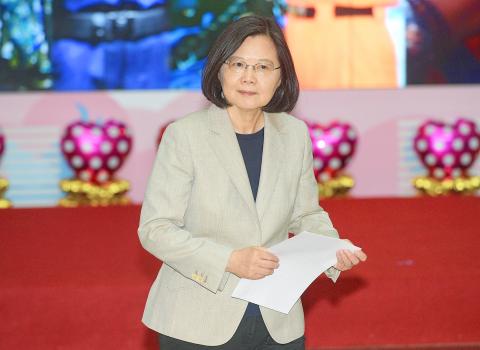The US Senate on Tuesday unanimously passed Concurrent Resolution 13 reaffirming the US’ commitment to Taiwan and to the implementation of its Taiwan Relations Act (TRA).
The US House of Representatives version of the resolution was passed by the House Foreign Affairs Committee on April 9.
The resolution was introduced on April 4 by US Senator Cory Gardner, chairman of the US Senate Foreign Relations Committee’s Subcommittee on East Asia, the Pacific and International Cybersecurity Policy.

Photo: Chang Chia-ming, Taipei Times
It was cosponsored by Senate Foreign Relations Committee Chairman James Risch, Senate Armed Services Committee Chairman James Inhofe and US senators Robert Menendez and Edward Markey, among others.
Besides recognizing the TRA and the “six assurances” as the “cornerstones of United States relations with Taiwan,” the resolution encourages mutual visits between Taiwanese and US officials at all levels in accordance with the US’ Taiwan Travel Act.
In the resolution, the US Senate “reiterates that the president should conduct regular transfers of defense articles to Taiwan,” “calls upon the secretary of state to actively engage internationally in support of Taiwan’s meaningful participation in international organizations,” and “urges the president to explore opportunities to expand and deepen bilateral economic and trade relations with Taiwan.”
President Tsai Ing-wen (蔡英文) yesterday said that the resolution’s passage was an “important expression of the US Congress’ attitude.”
The resolution shows that relations between Taiwan and the US are at their best, she said.
“The efforts of the government have been allowing the US and other [members of the] international community to work together with Taiwan to protect values shared internationally, and to become partners in the goal of regional peace and stability,” Tsai said.
Many countries in the region see Taiwan as an “indispensable partner,” she added.
The passage of “Taiwan-friendly resolutions” by the US Congress carries significant meaning in a year when the TRA is celebrating its 40th anniversary, yet China is attempting to “force ‘one country, two systems’ on Taiwan, dispatching military aircraft across the median line of the Taiwan Strait to engage in provocation and publicly destroying the cross-strait ‘status quo,’” the Taipei Economic and Cultural Representative Office in the US said.
Additional reporting by Aaron Tu

NATIONAL SECURITY THREAT: An official said that Guan Guan’s comments had gone beyond the threshold of free speech, as she advocated for the destruction of the ROC China-born media influencer Guan Guan’s (關關) residency permit has been revoked for repeatedly posting pro-China content that threatens national security, the National Immigration Agency said yesterday. Guan Guan has said many controversial things in her videos posted to Douyin (抖音), including “the red flag will soon be painted all over Taiwan” and “Taiwan is an inseparable part of China,” while expressing hope for expedited “reunification.” The agency received multiple reports alleging that Guan Guan had advocated for armed reunification last year. After investigating, the agency last month issued a notice requiring her to appear and account for her actions. Guan Guan appeared as required,

Japan and the Philippines yesterday signed a defense pact that would allow the tax-free provision of ammunition, fuel, food and other necessities when their forces stage joint training to boost deterrence against China’s growing aggression in the region and to bolster their preparation for natural disasters. Japan has faced increasing political, trade and security tensions with China, which was angered by Japanese Prime Minister Sanae Takaichi’s remark that a Chinese attack on Taiwan would be a survival-threatening situation for Japan, triggering a military response. Japan and the Philippines have also had separate territorial conflicts with Beijing in the East and South China

A strong cold air mass is expected to arrive tonight, bringing a change in weather and a drop in temperature, the Central Weather Administration (CWA) said. The coldest time would be early on Thursday morning, with temperatures in some areas dipping as low as 8°C, it said. Daytime highs yesterday were 22°C to 24°C in northern and eastern Taiwan, and about 25°C to 28°C in the central and southern regions, it said. However, nighttime lows would dip to about 15°C to 16°C in central and northern Taiwan as well as the northeast, and 17°C to 19°C elsewhere, it said. Tropical Storm Nokaen, currently

PAPERS, PLEASE: The gang exploited the high value of the passports, selling them at inflated prices to Chinese buyers, who would treat them as ‘invisibility cloaks’ The Yilan District Court has handed four members of a syndicate prison terms ranging from one year and two months to two years and two months for their involvement in a scheme to purchase Taiwanese passports and resell them abroad at a massive markup. A Chinese human smuggling syndicate purchased Taiwanese passports through local criminal networks, exploiting the passports’ visa-free travel privileges to turn a profit of more than 20 times the original price, the court said. Such criminal organizations enable people to impersonate Taiwanese when entering and exiting Taiwan and other countries, undermining social order and the credibility of the nation’s